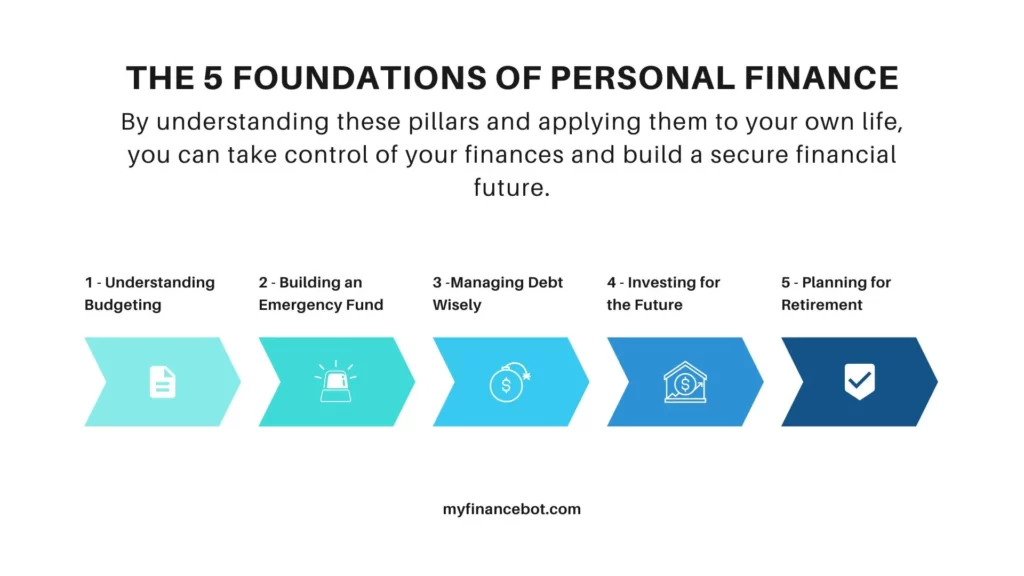Hey money friends!
Your friendly neighborhood finance guru here, with over a decade of experience helping folks just like you navigate the wonderful (and sometimes overwhelming) world of personal finance. Today, we’re diving deep into the 5 bedrock principles that form the foundation for a secure and prosperous financial future.
Why Personal Finance Matters?
Let’s face it, life throws curveballs. From surprise car repairs to unexpected medical bills, having a solid financial plan is your secret weapon against financial stress and uncertainty. By mastering these 5 pillars, you’ll gain control of your money, build wealth, and achieve your financial goals – whatever they may be!

Understanding Budgeting
Think of a budget as your financial GPS. It tracks your income and expenses, showing you exactly where your money goes. This empowers you to make informed decisions and identify areas to save or invest more effectively.
Here’s how to budget like a boss:
- Track your income: Every penny counts! Include your salary, side hustles, and any other income streams.
- Identify fixed expenses: Rent, utilities, insurance – these are the bills that stay the same month-to-month.
- Track variable expenses: Groceries, entertainment, subscriptions – these can fluctuate, so monitor them closely.
- Create a budget: Allocate your income towards your expenses and savings goals. Lots of free budgeting apps are available to help!
- Monitor and adjust: Regularly review your budget and adjust it as needed. Life changes, so your budget should too!
Pro Tip: For a deeper dive on budgeting, check out How to Create a Budget and Stick to It – a treasure trove of budgeting resources!

Tips for Effective Budgeting
- Track Your Income and Expenses: Start by meticulously recording your income and all expenses. This includes both fixed costs like rent or mortgage payments and variable costs like groceries or entertainment. By having a clear understanding of your cash flow, you can identify areas for improvement.
- Set Realistic Goals: Establish short-term and long-term financial goals. Whether it’s saving for a down payment on a house or paying off debt, having specific objectives will help you stay focused and motivated.
- Monitor Your Progress: Regularly review your budget to gauge your progress. Adjust your spending habits and financial priorities as necessary to stay on track.
Building an Emergency Fund
Life is full of surprises (some good, some not so good). An emergency fund acts as a cushion, protecting you from unexpected expenses like job loss or medical emergencies. Aim to save 3-6 months’ worth of living expenses in a readily accessible account.

Strategies for Building an Emergency Fund:
- Review your budget: Look for areas to cut back on discretionary spending and redirect those funds to your emergency fund.
- Set a target: Aim high! 3-6 months of living expenses may seem daunting, but break it down into manageable chunks.
- Automate savings: Set up automatic transfers from your checking account to your emergency fund. Pay yourself first!
Managing Debt Wisely
The Impact of Debt on Personal Finances
Debt can be a major roadblock to financial freedom. The key is to manage it wisely. High-interest debt, like credit cards, can quickly snowball, so prioritize paying those off first. Here are some strategies:
- Debt snowball vs. avalanche: Consider the debt snowball method (paying off the smallest debts first) for a quick win and motivation boost, or the debt avalanche method (focusing on high-interest debts) to save money on interest in the long run.
- Consolidation and Refinance: Explore options to consolidate debts or refinance loans to secure lower interest rates.
- Create a repayment plan: Develop a structured plan that fits your budget and stick to it!
Investing for the Future
The Power of Investing
Investing allows your money to work for you! By investing consistently over time, you can harness the power of compound interest and grow your wealth for long-term goals like retirement.

Key principles for smart investing
- Diversification: Spread your investments across different asset classes (stocks, bonds, real estate) to mitigate risk.
- Long-term view: Investing is a marathon, not a sprint. Don’t panic during market fluctuations!
- Seek professional advice: Consider consulting a financial advisor for personalized guidance tailored to your risk tolerance and goals.
See This: How AI-Powered Investing Is The Next Big Trend in Finance
Planning for Retirement
The Importance of Retirement Planning
Retirement planning might seem far off, but starting early reaps tremendous benefits. Estimate your retirement needs, factor in inflation, and explore retirement accounts like 401(k)s and IRAs.
Key Elements of Retirement Planning
- Estimate Your Retirement Needs: Calculate the approximate amount of money you’ll need for a comfortable retirement. Consider factors like living expenses, healthcare costs, and desired activities during retirement.
- Start Early: The earlier you start saving for retirement, the better. Take advantage of the power of compounding by investing consistently over time.
- Explore Retirement Accounts: Investigate retirement account options, such as 401(k)s or Individual Retirement Accounts (IRAs). Maximize your contributions to these accounts to benefit from potential tax advantages and employer matching programs.
10 Steps to Retire as a Millionaire

Conclusion
The 5 foundations of personal finance are a powerful tool that can help you achieve financial success. By understanding these pillars and applying them to your own life, you can take control of your finances and build a secure financial future.
Who Coined The Term FI/RE (Financially-Independent, Retired Early)?
Essential Resources for Your Financial Journey:
- Ramsey Solutions: [https://www.ramseysolutions.com/] – Dave Ramsey’s popular site offers practical advice to get out of debt and build wealth.
- The Personal Finance Club – https://www.personalfinanceclub.com/